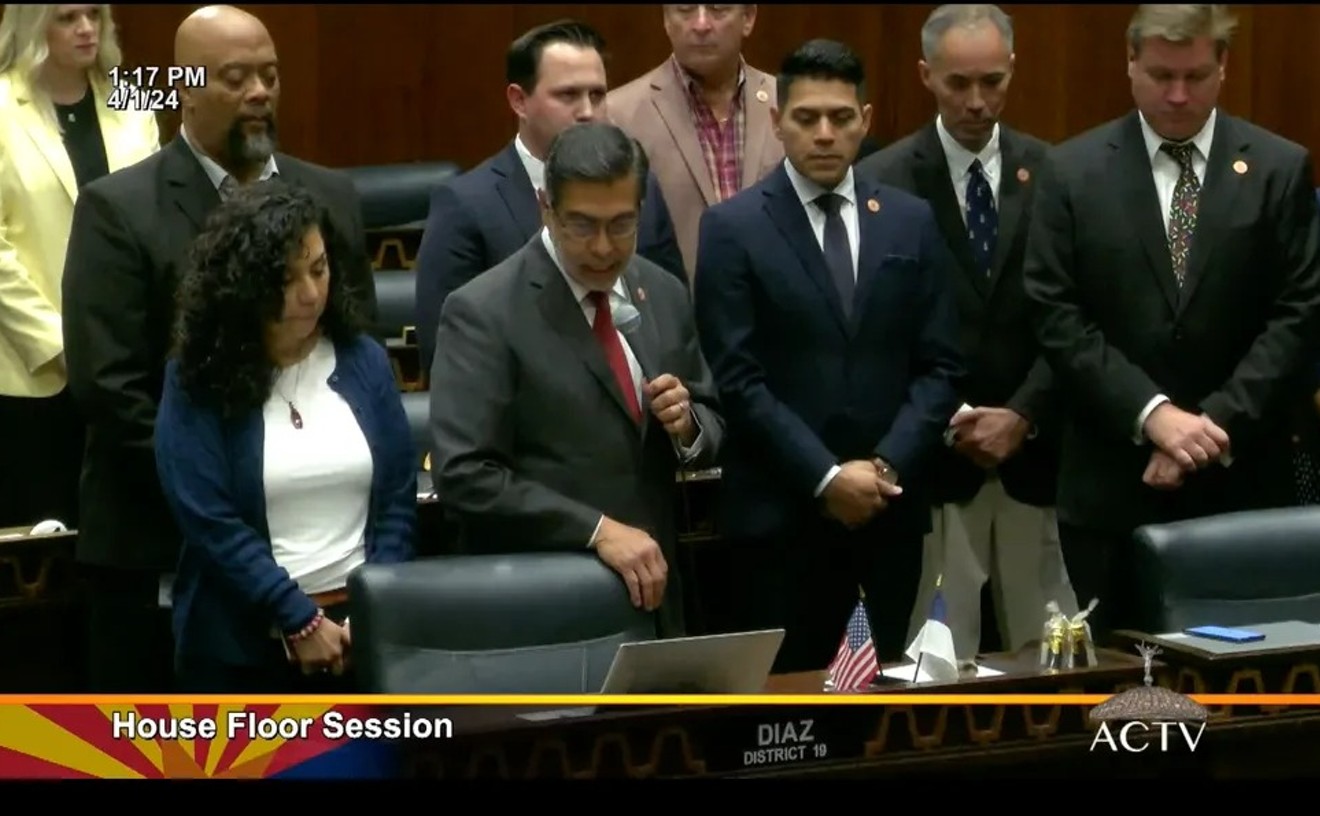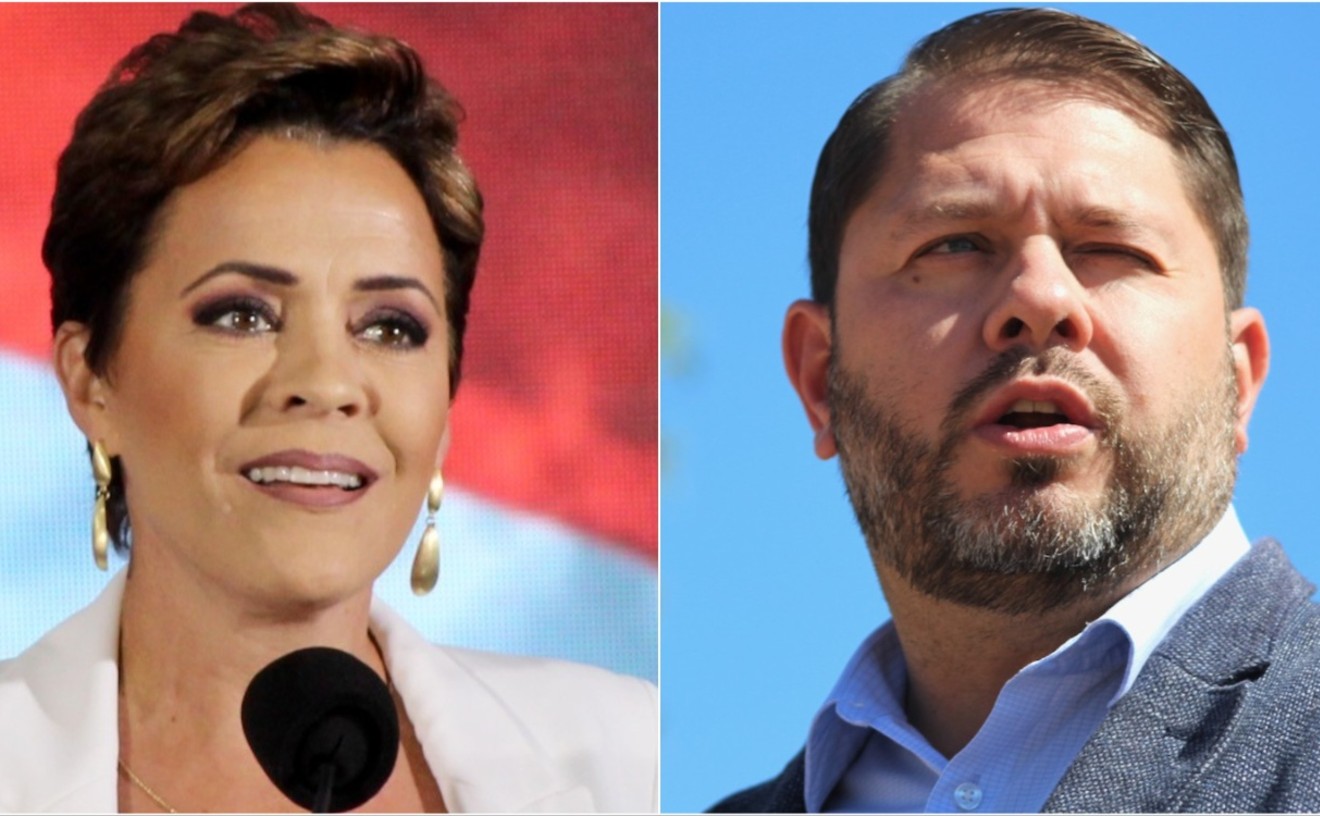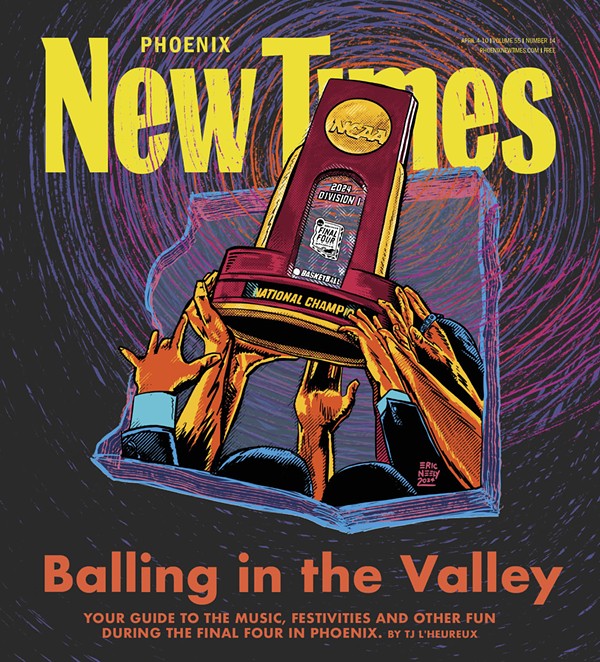"Not everybody's the same just because you come from the same family," Glen Gaddie says.
But the fact that the two brothers have opened charter schools is no accident. Glen and Reed Gaddie, their three sisters and parents Delite and Ernest Gaddie have specialized in running alternative schools in the Valley for more than 20 years. Some of the family's efforts have been successful, others disastrous. And some of the publicity that has resulted has definitely tarnished the family name.
Already, there is reason for concern about Burke Basic School. It's being sponsored by Peach Springs, a unified school district on the Hualapai Indian Reservation that is new to the charter school scene and is in hot water with the state over financial problems. Despite Glen Gaddie's assurances that there is nothing to worry about, state officials say funding for the district -- and its 14 charter schools around the state -- could be cut off if it loses a pending court case.
All this makes Glen Gaddie hesitant to talk with New Times about his latest efforts.
"So the gist of the story is going to be that the rotten Gaddie family is opening another school?" he asks.
While some of the Gaddie family efforts have indeed turned rotten, Glen Gaddie's recent work has been lauded by officials involved in Arizona's charter schools. For the last two years, Gaddie has served as principal of Noah Webster Basic School in Mesa, which is operated by his sister Kelly Wade and is one of the largest charter schools in the state. It espouses the Gaddie family philosophy of success through old-fashioned basic skills and discipline.
"It's a very, very successful school with a really good track record," says Mary Gifford, director of the Goldwater Institute's Center for Market-Based Education. The center, which supports Arizona's charter school movement, tracks schools and attempts to aid parents in deciding which school would fit their children's needs. Gifford says parents at Noah Webster are happy with the school.
Burke Basic School, started by Glen Gaddie as an offshoot of Noah Webster, is expected to be successful, too. The messy collapse of Reed Gaddie's Arizona Career and Technology charter school in January 1998, midway through its first school year, shouldn't reflect on Glen Gaddie, says Gifford. "Glen really wasn't part of ACT," she says.
Herman Parker, superintendent of the Peach Springs Unified School District, says officials there are aware of some of the Gaddie family members' checkered pasts. But they are confident that this Gaddie will do a good job running his own school.
"I think he is one of the better ones [in the charter school business]," Parker says.
Apparently, so do East Valley parents. The kindergarten through sixth grade school is chartered for a maximum of 500 students. Gaddie says more than 430 children have registered.
Burke Basic School, named after 18th-century political theorist Edmund Burke, is housed in The Living Word Bible Church at 131 East Southern. It stresses phonics and uses the English form method of class placement, meaning children will be grouped by ability rather than year. It will strive to advance children more than one grade level per year, much like the Noah Webster school claims it does. And it will use teachers who are experienced and fingerprinted, but not necessarily certified.
Gaddie says he uses a two-hour interview process to assess whether a teacher will bring not only knowledge but enthusiasm to the job.
Operated by a for-profit company belonging to Glen Gaddie and his wife, the school's administration consists of those two and Gaddie's parents. A door-hanger recently distributed in the East Valley announcing the opening of Burke touts its "proven, successful curriculum" and administrators with "over 25 years of private and charter school experience."
Glen Gaddie says the Burke curriculum is based on not only his work at Noah Webster, but also the methods devised by his parents when they opened the John Hancock Academy in Mesa during the 1970s. That private school, which the family ran for nine years, used McGuffey readers in its curriculum, a series of textbooks written in the 1800s. The academy closed when the Mesa Unified School District opened its own, free back-to-basics school.
The family soon opened the Mountain States Technical Institute, a school that recruited students from blood banks and welfare lines. When the state board regulating such technical schools first threatened to shut it down in 1990, Glen Gaddie, vice president and director, offered a tearful plea for a reprieve to help keep "the least of the brethren" in school. The institute, specializing in air-conditioning and word processing courses, continued to be plagued with questions of false advertising, mismanagement and mishandling of federal money. It closed in 1991 and filed for bankruptcy, leaving more than 350 students in the lurch.
A few years later, in 1994, Arizona passed legislation authorizing charter schools, and the Gaddies embraced the new system. They filed various school applications with different sponsoring entities. When the McGuffey Basic School was turned down because of the state's concern about McGuffey textbooks' references to God, one of the Gaddie sisters republished the readers deleting the offending passages. It is that reader, touted by supporters as a return to lost values and criticized by others as a step back into antiquity, that is used in the Webster and Burke schools.
Gaddie family members eventually became involved in four charter schools. Listings of board members and staff members often read like a family tree, with not only the Gaddie parents and siblings but their spouses hired to help run, teach and even clean the schools.
Touted as a way to provide private-school-style education for free, charters have more freedom in hiring teachers and developing curricula. But they must adhere to certain financial and testing requirements, like all Arizona public schools.
They may be chartered by the state Board of Education, the state Charter School Board or individual school districts. Arizona's charter school laws, considered the most liberal in the country, have resulted in a proliferation of schools, with nearly 350 school sites approved for about 180 operators.
While some school districts have sponsored charter schools in their areas, a few have decided to go into the long-distance charter school business. Districts found they could make extra money by approving out-of-town charters, either charging a per-charter fee or a cut of the per-capita fee the state doles out to its charter schools. The problem, as the Window Rock School District on the Navajo reservation found out, was that overseeing charters from a great distance was tough. And risky.
Window Rock revoked the charter for Reed Gaddie's Arizona Career and Technology High School in Mesa after that school was deluged with accusations of shoddy management and operations. The district divested itself of all its other charters, including Noah Webster Basic School, whose charter is now sponsored by the Snow Flake Unified School District. Snow Flake's two school districts, Higley Elementary and Peach Springs Unified, have stepped in as the largest players in the out-of-town charter sponsoring game.
Burke Basic School was the first charter sponsored by Peach Springs in April. Since then, the district has sponsored 13 more charter schools around Arizona, charging a percentage of the roughly $4,000 per student allocation that charter schools receive from state coffers. Superintendent Parker says he doesn't foresee running into trouble tracking these schools.
"I don't think it's too difficult, with the proper personnel in the proper positions and the proper kind of expertise," Parker says. Window Rock ran into difficulties because it was so remote compared to the locations of its schools, he explains. "We're more centrally located."
Actually, Peach Springs, which serves a few hundred students in grades K-12, is on the Hualapai Indian Reservation, 55 miles east of Kingman, in the northeastern corner of Mohave County. And the schools it sponsors are sprinkled from Tucson to Ganado, with seven in the Phoenix area.
Despite Parker's assurances that the tiny district can handle the oversight of 14 schools authorized to teach more than 2,200 kids, state officials are not so confident.
Laura Penny of the Arizona Department of Education says the state Board of Education found Peach Springs in noncompliance with financial reporting requirements, and on May 17 voted to withhold state funds from the district. Money -- including the district's share that goes to the charter schools -- is continuing to flow while the case is on appeal in Mohave County Superior Court.
But Penny wonders whether operators of charter schools sponsored by Peach Springs realize what could happen. Eleven of those charters were issued in June, just weeks after the vote to withhold the district's funds.
"I'm not sure whether the charter schools understand that if Peach Springs is ultimately unsuccessful [in court], we stop paying them all money. That leaves the charter schools high and dry as well," she says. "I'm not sure they are aware of the risk."
Penny says the department tried unsuccessfully to get legislation passed this year preventing any school district out of compliance with financial reporting requirements from sponsoring any charter schools.
"If they can't keep their own money in line, why should we give them more?" she asks.
In Peach Springs, Parker downplays the ongoing dispute with the state board. "I wouldn't classify it as trouble," he says. "We've had some auditing difficulties, but a lot of that's old stuff."
Penny says many of the problems arose out of old audits, but the district has failed to correct things and the case has dragged on for years.
Glen Gaddie says he's not worried about Peach Springs' ability to keep funneling state money to his school. He admits he doesn't know all the specifics of the case, but he has spoken with those who do, including superintendent Parker, the district's lawyer and officials at Arizona Benefit Solution, Inc., the Cottonwood firm that helps match charter schools with sponsors and handles finances for many of them, including Burke.
"To me, it's a non-issue," Gaddie says. He points out that the Uniform System of Financial Records, with which schools must comply, is an incredibly complex set of rules. Noncompliance letters are issued "right and left," he says, yet the state has never shut down a district. While he is confident that Peach Springs will get everything cleared up, he says if for some reason things don't work out, "I'll find another district."
For now, Gaddie is more concerned with getting the school going. He's excited about bringing hundreds more children into the fold of an educational system he believes in. This school, like Noah Webster, offers an all-day kindergarten, which he says is effective because children are most ready to learn at the age of 5.
"My little kids in kindergarten, they'll be reading short-vowel readers by December, and by the end of the year, they'll be reading the McGuffey primer," he says.










